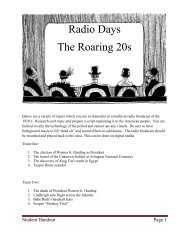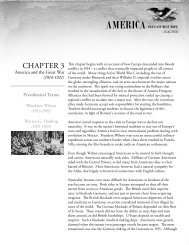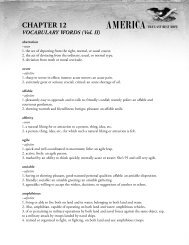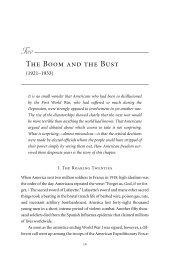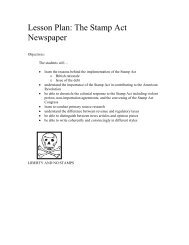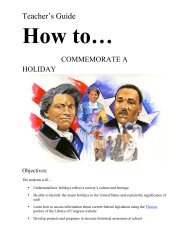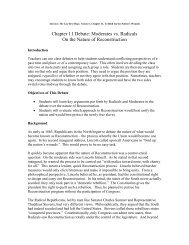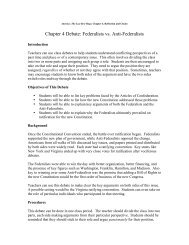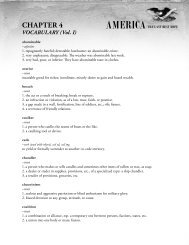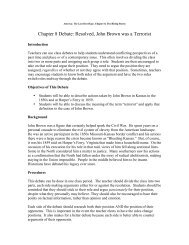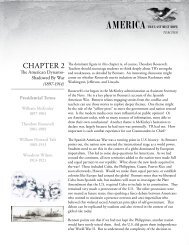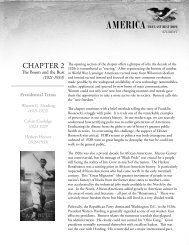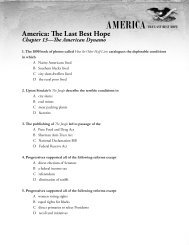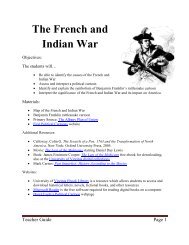AMERICA: THE LAST BEST HOPE CHAPTER 11 VOCABULARY ...
AMERICA: THE LAST BEST HOPE CHAPTER 11 VOCABULARY ...
AMERICA: THE LAST BEST HOPE CHAPTER 11 VOCABULARY ...
You also want an ePaper? Increase the reach of your titles
YUMPU automatically turns print PDFs into web optimized ePapers that Google loves.
<strong>CHAPTER</strong> <strong>11</strong><strong>VOCABULARY</strong> WORDS (Vol. I)<strong>AMERICA</strong>: <strong>THE</strong> <strong>LAST</strong> <strong>BEST</strong> <strong>HOPE</strong>absurdity–noun, plural -ties.1. the state or quality of being absurd.2. something absurd.agitation–noun1. the act or process of agitating; state of being agitated: She left in great agitation.2. persistent urging of a political or social cause or theory before the public.3. Also called psychomotor agitation. psychological and physical restlessness, manifested bypacing, handwringing, or other activity, sometimes occurring as a symptom of severe depression,schizophrenia, or other mental disorder.arbitration–noun1. the hearing and determining of a dispute or the settling of differences between parties by a personor persons chosen or agreed to by them: Rather than risk a long strike, the union and managementagreed to arbitration.2. International Law. the application of judicial methods to the settlement of international disputes.ardent–adjective1. having, expressive of, or characterized by intense feeling; passionate; fervent: an ardent vow; ardentlove.2. intensely devoted, eager, or enthusiastic; zealous: an ardent theatergoer. an ardent student ofFrench history.3. vehement; fierce: They were frightened by his ardent, burning eyes.4. burning, fiery, or hot: the ardent core of a star.assailant–nouna person who attacks.–adjectiveArchaic. assailing; attacking; hostile.atone–verb (used without object)1. to make amends or reparation, as for an offense or a crime, or for an offender (usually fol. by for):to atone for one’s sins.2. to make up, as for errors or deficiencies (usually fol. by for): to atone for one’s failings.3. Obsolete. to become reconciled; agree.
–verb (used with object)1. to make amends for; expiate: He atoned his sins.2. Obsolete. to bring into unity, harmony, concord, etc.<strong>AMERICA</strong>: <strong>THE</strong> <strong>LAST</strong> <strong>BEST</strong> <strong>HOPE</strong>avenger–verb (used with object), a venged, a veng ing.1. to take vengeance or exact satisfaction for: to avenge a grave insult.2. to take vengeance on behalf of: He avenged his brother.bigoted–adjectiveutterly intolerant of any creed, belief, or opinion that differs from one’s own.bogus–adjectivenot genuine; counterfeit; spurious; sham.–nounPrinting, Journalism. matter set, by union requirement, by a compositor and later discarded,duplicating the text of an advertisement for which a plate has been supplied or type set by anotherpublisher.boon–noun1. something to be thankful for; blessing; benefit.2. something that is asked; a favor sought.boudoir–nouna woman’s bedroom or private sitting room.brazen–adjective1. shameless or impudent: brazen presumption.2. made of brass.3. like brass, as in sound, color, or strength.–verb (used with object)to make brazen or bold.—verb phrasebrazen out or through, to face boldly or shamelessly: He prefers to brazen it out rather than admitdefeat.byword–noun1. a word or phrase associated with some person or thing; a characteristic expression, typical greeting,or the like.
2. a word or phrase used proverbially; common saying; proverb.3. an object of general reproach, derision, scorn, etc.: His crimes <strong>AMERICA</strong>: will make him a byword <strong>THE</strong> through <strong>LAST</strong> <strong>BEST</strong> <strong>HOPE</strong>the ages.4. an epithet, often of scorn.cahoots-plural noun. Informal; “in cahoots”questionable collaboration; secret partnership: an accountant in cahoots with organized crime.chivalrous–adjective1. having the qualities of chivalry, as courage, courtesy, and loyalty.2. considerate and courteous to women; gallant.3. gracious and honorable toward an enemy, esp. a defeated one, and toward the weak or poor.cipher–noun1. ZERO.2. any of the Arabic numerals or figures.3. Arabic numerical notation collectively.4. something of no value or importance.5. a person of no influence; nonentity.6. a secret method of writing, as by transposition or substitution of letters, specially formed symbols,or the like. Compare CRYPTOGRAPHY.7. writing done by such a method; a coded message.8. the key to a secret method of writing.9. a combination of letters, as the initials of a name, in one design; monogram.–verb (used without object)1. to use figures or numerals arithmetically.2. to write in or as in cipher.–verb (used with object)1. to calculate numerically; figure.2. to convert into cipher.clemency–noun, plural -cies.1. the quality of being clement; disposition to show forbearance, compassion, or forgiveness injudging or punishing; leniency; mercy.2. an act or deed showing mercy or leniency.3. (of the weather) mildness or temperateness.comply–verb (used without object), -plied, -ply ing.1. to act or be in accordance with wishes, requests, demands, requirements, conditions, etc.; agree(sometimes fol. by with): They asked him to leave and he complied. She has complied with the
equirements.2. Obsolete. to be courteous or conciliatory.<strong>AMERICA</strong>: <strong>THE</strong> <strong>LAST</strong> <strong>BEST</strong> <strong>HOPE</strong>confiscate–verb (used with object)1. to seize as forfeited to the public domain; appropriate, by way of penalty, for public use.2. to seize by or as if by authority; appropriate summarily: The border guards confiscated our moviecameras.–adjectiveseized.consort–noun1. a husband or wife; spouse, esp. of a reigning monarch. Compare PRINCE CONSORT, QUEENCONSORT.2. one vessel or ship accompanying another.3. Music.a. a group of instrumentalists and singers who perform music, esp. old music.b. a group of instruments of the same family, as viols, played in concert.4. a companion, associate, or partner: a confidant and consort of heads of state.5. accord or agreement.6. Obsolete.a. company or association.b. harmony of sounds.–verb (used without object)1. to associate; keep company: to consort with known criminals.2. to agree or harmonize.–verb (used with object)1. to associate, join, or unite.2. Obsolete.a. to accompany; espouse.b. to sound in harmony.constituency–noun, plural -cies.1. a body of constituents; the voters or residents in a district represented by an elective officer.2. the district itself.3. any body of supporters, customers, etc.; clientele.convene–verb (used without object)to come together or assemble, usually for some public purpose.–verb (used with object)1. to cause to assemble; convoke.2. to summon to appear, as before a judicial officer.
countermand–verb (used with object)1. to revoke or cancel (a command, order, etc.).2. to recall or stop by a contrary order.–nouna command, order, etc., revoking a previous one.<strong>AMERICA</strong>: <strong>THE</strong> <strong>LAST</strong> <strong>BEST</strong> <strong>HOPE</strong>coup d’état–noun, plural coups d’é tata sudden and decisive action in politics, esp. one resulting in a change of government illegally or byforce.courier–noun1. a messenger, usually traveling in haste, bearing urgent news, important reports or packages,diplomatic messages, etc.2. any means of carrying news, messages, etc., regularly.3. the conveyance used by a courier, as an airplane or ship.4. Chiefly British. a tour guide for a travel agency.covet–verb (used with object)1. to desire wrongfully, inordinately, or without due regard for the rights of others: to covet another’sproperty.2. to wish for, esp. eagerly: He won the prize they all coveted.–verb (used without object)to have an inordinate or wrongful desire.crony–noun, plural -nies.a close friend or companion; chum.demobilize–verb (used with object), -lized, -liz ing.1. to disband (troops, an army, etc.).2. to discharge (a person) from military service.despotism–noun1. the rule of a despot; the exercise of absolute authority.2. absolute power or control; tyranny.3. an absolute or autocratic government.4. a country ruled by a despot.
downtrodden–adjective<strong>AMERICA</strong>: <strong>THE</strong> <strong>LAST</strong> <strong>BEST</strong> <strong>HOPE</strong>1. tyrannized over; oppressed: the downtrodden plebeians of ancient Rome.2. trodden down; trampled upon.dubious–adjective1. doubtful; marked by or occasioning doubt: a dubious reply.2. of doubtful quality or propriety; questionable: a dubious compliment; a dubious transaction.3. of uncertain outcome: in dubious battle.4. wavering or hesitating in opinion; inclined to doubt.eclipse–noun1. Astronomy.a. the obscuration of the light of the moon by the intervention of the earth between it andthe sun (lunar eclipse) or the obscuration of the light of the sun by the intervention of themoon between it and a point on the earth (solar eclipse).b. a similar phenomenon with respect to any other planet and either its satellite or the sun.c. the partial or complete interception of the light of one component of a binary star by theother.2. any obscuration of light.3. a reduction or loss of splendor, status, reputation, etc.: Scandal caused the eclipse of his career.–verb (used with object)1. to cause to undergo eclipse: The moon eclipsed the sun.2. to make less outstanding or important by comparison; surpass: a soprano whose singing eclipsedthat of her rivals.enfranchise–verb (used with object), -chised, -chis ing.1. to grant a franchise to; admit to citizenship, esp. to the right of voting.2. to endow (a city, constituency, etc.) with municipal or parliamentary rights.3. to set free; liberate, as from slavery.expedient–adjective1. tending to promote some proposed or desired object; fit or suitable for the purpose; proper underthe circumstances: It is expedient that you go.2. conducive to advantage or interest, as opposed to right.3. acting in accordance with expediency.–noun1. a means to an end: The ladder was a useful expedient for getting to the second floor.2. a means devised or employed in an exigency; resource; shift: Use any expedients you thinknecessary to get over the obstacles in your way.
financier–noun<strong>AMERICA</strong>: <strong>THE</strong> <strong>LAST</strong> <strong>BEST</strong> <strong>HOPE</strong>a person skilled or engaged in managing large financial operations, whether public or corporate.–verb (used with object)to finance.–verb (used without object)to act as a financier.flagrant–adjective1. shockingly noticeable or evident; obvious; glaring: a flagrant error.2. notorious; scandalous: a flagrant crime; a flagrant offender.3. Archaic. blazing, burning, or glowing.garbled–verb (used with object)1. to confuse unintentionally or ignorantly; jumble: to garble instructions.2. to make unfair or misleading selections from or arrangement of (fact, statements, writings, etc.);distort: to garble a quotation.3. Archaic. to take out the best of.–noun1. the act or process of garbling.2. an instance of garbling; a garbled phrase, literary passage, etc.gritty–adjective, -ti er, -ti est.1. consisting of, containing, or resembling grit; sandy.2. resolute and courageous; plucky.gullible–adjectiveeasily deceived or cheated.hamper–verb (used with object)1. to hold back; hinder; impede: A steady rain hampered the progress of the work.2. to interfere with; curtail: The dancers’ movements were hampered by their elaborate costumes.–nounNautical. gear that, although necessary to the operations of a vessel, is sometimes in the way.harebrain–adjectivegiddy; reckless.
harrowing–adjective<strong>AMERICA</strong>: <strong>THE</strong> <strong>LAST</strong> <strong>BEST</strong> <strong>HOPE</strong>extremely disturbing or distressing; grievous: a harrowing experience.heckler–verb (used with object)to harass (a public speaker, performer, etc.) with impertinent questions, gibes, or the like; badger.hitherto-adverb1. up to this time; until now: a fact hitherto unknown.2. to here.honcho–nouna leader, esp. an assertive leader; chief.–verb (used with object)to organize, supervise, or be the leader of: She volunteered to honcho the new project.impoverish–verb (used with object)1. to reduce to poverty: a country impoverished by war.2. to make poor in quality, productiveness, etc.; exhaust the strength or richness of: Bad farmingpractices impoverished the soil.indictment–noun1. an act of indicting.2. Law. a formal accusation initiating a criminal case, presented by a grand jury and usually requiredfor felonies and other serious crimes.3. any charge, accusation, serious criticism, or cause for blame.4. the state of being indicted.infernal–adjective1. hellish; fiendish; diabolical: an infernal plot.2. extremely troublesome, annoying, etc.; outrageous: an infernal nuisance.3. of, inhabiting, or befitting hell.4. Classical Mythology. of or pertaining to the underworld.intemperate–adjective1. given to or characterized by excessive or immoderate indulgence in alcoholic beverages.2. immoderate in indulgence of appetite or passion.3. not temperate; unrestrained; unbridled.
4. extreme in temperature, as climate.<strong>AMERICA</strong>: <strong>THE</strong> <strong>LAST</strong> <strong>BEST</strong> <strong>HOPE</strong>irascible–adjective1. easily provoked to anger; very irritable: an irascible old man.2. characterized or produced by anger: an irascible response.intransigence–adjectiverefusing to agree or compromise; uncompromising; inflexible.–nouna person who refuses to agree or compromise, as in politics.jingo–noun1. a person who professes his or her patriotism loudly and excessively, favoring vigilant preparednessfor war and an aggressive foreign policy; bellicose chauvinist.2. English History. a Conservative supporter of Disraeli’s policy in the Near East during the period1877–78.–adjective1. of jingoes.2. characterized by jingoism.—Idiomby jingo! Informal. (an exclamation used to emphasize the truth or importance of a foregoingstatement, or to express astonishment, approval, etc.): I know you can do it, by jingo!kith and kin–nounacquaintances and relatives.languish–verb (used without object)1. to be or become weak or feeble; droop; fade.2. to lose vigor and vitality.3. to undergo neglect or experience prolonged inactivity; suffer hardship and distress: to languish inprison for ten years.4. to be subjected to delay or disregard; be ignored: a petition that languished on the warden’s deskfor a year.5. to pine with desire or longing.6. to assume an expression of tender, sentimental melancholy.–noun1. the act or state of languishing.2. a tender, melancholy look or expression.
largesse–noun1. generous bestowal of gifts.2. the gift or gifts, as of money, so bestowed.3. Obsolete. generosity; liberality.<strong>AMERICA</strong>: <strong>THE</strong> <strong>LAST</strong> <strong>BEST</strong> <strong>HOPE</strong>liable–adjective1. legally responsible: You are liable for the damage caused by your action.2. subject or susceptible: to be liable to heart disease.3. likely or apt: He’s liable to get angry.manifestation–noun1. an act of manifesting.2. the state of being manifested.3. outward or perceptible indication; materialization: At first there was no manifestation of thedisease.4. a public demonstration, as for political effect.5. Spiritualism. a materialization.misnomer–noun1. a misapplied or inappropriate name or designation.2. an error in naming a person or thing.morbid–adjective1. suggesting an unhealthy mental state or attitude; unwholesomely gloomy, sensitive, extreme, etc.: amorbid interest in death.2. affected by, caused by, causing, or characteristic of disease.3. pertaining to diseased parts: morbid anatomy.4. gruesome; grisly.naïve–adjective1. having or showing unaffected simplicity of nature or absence of artificiality; unsophisticated;ingenuous.2. having or showing a lack of experience, judgment, or information; credulous: She’s so naive shebelieves everything she reads. He has a very naive attitude toward politics.3. having or marked by a simple, unaffectedly direct style reflecting little or no formal training ortechnique: valuable naive 19th-century American portrait paintings.4. not having previously been the subject of a scientific experiment, as an animal.
odious–adjective1. deserving or causing hatred; hateful; detestable.2. highly offensive; repugnant; disgusting.<strong>AMERICA</strong>: <strong>THE</strong> <strong>LAST</strong> <strong>BEST</strong> <strong>HOPE</strong>pall–noun1. a cloth, often of velvet, for spreading over a coffin, bier, or tomb.2. a coffin.3. anything that covers, shrouds, or overspreads, esp. with darkness or gloom.4. Ecclesiastical.a. PALLIUM (def. 2b).b. a linen cloth or a square cloth-covered piece of cardboard used to cover a chalice.5. Heraldry. PAIRLE.6. Archaic. a cloth spread upon an altar; corporal.7. Archaic. a garment, esp. a robe, cloak, or the like.–verb (used with object)to cover with or as with a pall.parole–noun1. Penology.a. the conditional release of a person from prison prior to the end of the maximum sentenceimposed.b. such release or its duration.c. an official document authorizing such a release.2. Military.a. the promise, usually written, of a prisoner of war, that if released he or she either willreturn to custody at a specified time or will not again take up arms against his or hercaptors.b. (formerly) any password given by authorized personnel in passing by a guard.3. word of honor given or pledged.4. (in U.S. immigration laws) the temporary admission of aliens into the U.S. for emergency reasonsor on grounds considered in the public interest, as authorized by and at the discretion of the attorneygeneral.–verb (used with object)1. to place or release on parole.2. to admit (an alien) into the U.S. under the parole provision: An increased number of Hungarianrefugees were paroled into the United States.–adjectiveof or pertaining to parole or parolees: a parole record.parricide–noun1. the act of killing one’s father, mother, or other close relative.
2. a person who commits such an act.patricide–noun1. the act of killing one’s own father.2. a person who commits such an act.<strong>AMERICA</strong>: <strong>THE</strong> <strong>LAST</strong> <strong>BEST</strong> <strong>HOPE</strong>perilous–adjectiveinvolving or full of grave risk or peril; hazardous; dangerous: a perilous voyage across the Atlantic ina small boat.plank–noun; (of a political “platform”)any one of the stated principles or objectives comprising the political platform of a partycampaigning for election: They fought for a plank supporting a nuclear freeze.pompous–adjective1. characterized by an ostentatious display of dignity or importance: a pompous minor official.2. ostentatiously lofty or high-flown: a pompous speech.3. characterized by pomp, stately splendor, or magnificence.prodigy–noun, plural -gies.1. a person, esp. a child or young person, having extraordinary talent or ability: a musical prodigy.2. a marvelous example (usually fol. by of).3. something wonderful or marvelous; a wonder.4. something abnormal or monstrous.5. Archaic. something extraordinary regarded as of prophetic significance.prostrate–verb (used with object)1. to cast (oneself) face down on the ground in humility, submission, or adoration.2. to lay flat, as on the ground.3. to throw down level with the ground.4. to overthrow, overcome, or reduce to helplessness.5. to reduce to physical weakness or exhaustion.–adjective1. lying flat or at full length, as on the ground.2. lying face down on the ground, as in token of humility, submission, or adoration.3. overthrown, overcome, or helpless: a country left prostrate by natural disasters.4. physically weak or exhausted.5. SUBMISSIVE.6. utterly dejected or depressed; disconsolate.
7. Botany. (of a plant or stem) lying flat on the ground.<strong>AMERICA</strong>: <strong>THE</strong> <strong>LAST</strong> <strong>BEST</strong> <strong>HOPE</strong>quash–verb (used with object)1. to put down or suppress completely; quell; subdue: to quash a rebellion.2. to make void, annul, or set aside (a law, indictment, decision, etc.).rabid–adjective1. irrationally extreme in opinion or practice: a rabid isolationist; a rabid baseball fan.2. furious or raging; violently intense: a rabid hunger.3. affected with or pertaining to rabies; mad.ratification–noun1. the act of ratifying; confirmation; sanction.2. the state of being ratified.reconciliation–noun1. an act of reconciling or the state of being reconciled.2. the process of making consistent or compatible.reconstitute–verb (used with object)1. to constitute again; reconstruct; recompose.2. to return (a dehydrated or concentrated food) to the liquid state by adding water: to reconstitute abouillon cube with hot water.–verb (used without object)to undergo reconstitution; become reconstituted.recurrent–adjective1. that recurs; occurring or appearing again, esp. repeatedly or periodically.2. Anatomy. turned back so as to run in a reverse direction, as a nerve, artery, branch, etc.redeemer–nouna person who redeems.remand-verb1. to send back, remit, or consign again.2. Law.a. to send back (a case) to a lower court from which it was appealed, with instructions as to
what further proceedings should be had.b. (of a court or magistrate) to send back (a <strong>AMERICA</strong>: <strong>THE</strong> <strong>LAST</strong> <strong>BEST</strong> <strong>HOPE</strong>prisoner or accused person) into custody, as to await further proceedings.–noun1. the act of remanding.2. the state of being remanded.3. a person remanded.renaissance–noun1. the activity, spirit, or time of the great revival of art, literature, and learning in Europe beginningin the 14th century and extending to the 17th century, marking the transition from the medieval tothe modern world.2. the forms and treatments in art used during this period.3. (sometimes lowercase ) any similar revival in the world of art and learning.4. (lowercase ) a renewal of life, vigor, interest, etc.; rebirth; revival: a moral renaissance.–adjective1. of, pertaining to, or suggestive of the European Renaissance of the 14th through the 17thcenturies: Renaissance attitudes.2. noting or pertaining to the group of architectural styles existing in Italy in the 15th and16th centuries as adaptations of ancient Roman architectural details or compositional forms tocontemporary uses, characterized at first by the free and inventive use of isolated details, later bythe more imitative use of whole orders and compositional arrangements, with great attention to theformulation of compositional rules after the precepts of Vitruvius and the precedents of existingruins, and at all periods by an emphasis on symmetry, exact mathematical relationships betweenparts, and a general effect of simplicity and repose.3. noting or pertaining to any of the various adaptations of this group of styles in foreign architecturecharacterized typically by the playful or grotesque use of isolated details in more or less traditionalbuildings.4. noting or pertaining to the furnishings or decorations of the Renaissance, in which motifs ofclassical derivation frequently appear.resolve–verb (used with object)1. to come to a definite or earnest decision about; determine (to do something): I have resolved that Ishall live to the full.2. to separate into constituent or elementary parts; break up; cause or disintegrate (usually fol. byinto).3. to reduce or convert by, or as by, breaking up or disintegration (usually fol. by to or into).4. to convert or transform by any process (often used reflexively).5. to reduce by mental analysis (often fol. by into).6. to settle, determine, or state formally in a vote or resolution, as of a deliberative assembly.7. to deal with (a question, a matter of uncertainty, etc.) conclusively; settle; solve: to resolve thequestion before the board.8. to clear away or dispel (doubts, fears, etc.); answer: to resolve any doubts we may have had.
3. Fencing.a. a sword having two cutting edges and a <strong>AMERICA</strong>: <strong>THE</strong> <strong>LAST</strong> <strong>BEST</strong> <strong>HOPE</strong>blunt point.b. the art or sport of fencing with the saber, with the target being limited to the head, trunk,and arms, and hits being made with the front edge and the upper part of the back edge ofthe sword and by thrusts.–verb (used with object)to strike, wound, or kill with a saber.scam–nouna confidence game or other fraudulent scheme, esp. for making a quick profit; swindle.–verb (used with object)to cheat or defraud with a scam.scorn–noun1. open or unqualified contempt; disdain: His face and attitude showed the scorn he felt.2. an object of derision or contempt.3. a derisive or contemptuous action or speech.–verb (used with object)1. to treat or regard with contempt or disdain: They scorned the old beggar.2. to reject, refuse, or ignore with contempt or disdain: She scorned my help.–verb (used without object)to mock; jeer.—Idiomlaugh to scorn, to ridicule; deride: Her good advice was laughed to scorn.scrupulous–adjective1. having scruples; having or showing a strict regard for what one considers right; principled.2. punctiliously or minutely careful, precise, or exact: a scrupulous performance.scuffle–verb (used without object)1. to struggle or fight in a rough, confused manner.2. to go or move in hurried confusion.3. to move or go with a shuffle; scuff.–noun1. a rough, confused struggle or fight.2. a shuffling: a scuffle of feet.3. Also called scuffle hoe. a spadelike hoe that is pushed instead of pulled.4. (in tap dancing) a forward and backward movement of the foot.
sectarian–adjective<strong>AMERICA</strong>: <strong>THE</strong> <strong>LAST</strong> <strong>BEST</strong> <strong>HOPE</strong>1. of or pertaining to sectaries or sects.2. narrowly confined or devoted to a particular sect.3. narrowly confined or limited in interest, purpose, scope, etc.–noun1. a member of a sect.2. a bigoted or narrow-minded adherent of a sect.shrewd–adjective, -er, -est.1. astute or sharp in practical matters: a shrewd politician.2. keen; piercing.3. ARTFUL.4. Archaic. MALICIOUS.5. Obsolete. BAD.6. Obsolete. SHREWISH.shrill–adjective1. high-pitched and piercing in sound quality: a shrill cry.2. producing such a sound.3. full of or characterized by such a sound: shrill music.4. betraying some strong emotion or attitude in an exaggerated amount, as antagonism ordefensiveness.5. marked by great intensity; keen: the shrill, incandescent light of the exploding bomb.–verb (used with object), verb (used without object)to cry shrilly.–nouna shrill sound.–adverbin a shrill manner; shrilly.simian–adjective1. of or pertaining to an ape or monkey.2. characteristic of apes or monkeys: long, simian fingers.–nounan ape or monkey.“slate”–noun; (political term)a list of candidates, officers, etc., to be considered for nomination, appointment, election, or the like.
slovenly–adjective1. untidy or unclean in appearance or habits.2. characteristic of a sloven; slipshod: slovenly work.–adverbin an untidy, careless, or slipshod manner.<strong>AMERICA</strong>: <strong>THE</strong> <strong>LAST</strong> <strong>BEST</strong> <strong>HOPE</strong>soliloquy–noun, plural -quies.1. an utterance or discourse by a person who is talking to himself or herself or is disregardful of oroblivious to any hearers present (often used as a device in drama to disclose a character’s innermostthoughts): Hamlet’s soliloquy begins with “To be or not to be.”2. the act of talking while or as if alone.tarnish–verb (used with object)1. to dull the luster of (a metallic surface), esp. by oxidation; discolor.2. to diminish or destroy the purity of; stain; sully: The scandal tarnished his reputation.–verb (used without object)1. to grow dull or discolored; lose luster.2. to become sullied.–noun1. a tarnished coating.2. tarnished condition; discoloration; alteration of the luster of a metal.3. a stain or blemish.tirade–noun1. a prolonged outburst of bitter, outspoken denunciation: a tirade against smoking.2. a long, vehement speech: a tirade in the Senate.3. a passage dealing with a single theme or idea, as in poetry: the stately tirades of Corneille.tribunal–noun1. a court of justice.2. a place or seat of judgment.3. Also called tribune. a raised platform for the seats of magistrates, as in an ancient Roman basilica.spontaneous–adjective1. coming or resulting from a natural impulse or tendency; without effort or premeditation; naturaland unconstrained; unplanned: a spontaneous burst of applause.2. (of a person) given to acting upon sudden impulses.3. (of natural phenomena) arising from internal forces or causes; independent of external agencies;self-acting.
4. growing naturally or without cultivation, as plants andfruits; indigenous.5. produced by natural process.<strong>AMERICA</strong>: <strong>THE</strong> <strong>LAST</strong> <strong>BEST</strong> <strong>HOPE</strong>spree–noun1. a lively frolic or outing.2. a bout or spell of drinking to intoxication; binge; carousal.3. a period, spell, or bout of indulgence, as of a particular wish, craving, or whim: an eating spree; aspending spree.4. a period or outburst of extreme activity: Our basketball team went on a scoring spree and won <strong>11</strong>4to 78.strident–adjective1. making or having a harsh sound; grating; creaking: strident insects; strident hinges.2. having a shrill, irritating quality or character: a strident tone in his writings.3. Linguistics. (in distinctive feature analysis) characterized acoustically by noise of relatively highintensity, as sibilants, labiodental and uvular fricatives, and most affricates.suffrage/suffragette–noun1. the right to vote, esp. in a political election.2. a vote given in favor of a proposed measure, candidate, or the like.3. Ecclesiastical. a prayer, esp. a short intercessory prayer or petition.suppress–verb (used with object)1. to put an end to the activities of (a person, body of persons, etc.): to suppress the Communistparty.2. to do away with by or as by authority; abolish; stop (a practice, custom, etc.).3. to keep in or repress (a feeling, smile, groan, etc.).4. to withhold from disclosure or publication (truth, evidence, a book, names, etc.).5. to stop or arrest (a flow, hemorrhage, cough, etc.).6. to vanquish or subdue (a revolt, rebellion, etc.); quell; crush.7. Electricity. to reduce or eliminate (an irregular or undesired oscillation or frequency) in a circuit.sustain–verb (used with object)1. to support, hold, or bear up from below; bear the weight of, as a structure.2. to bear (a burden, charge, etc.).3. to undergo, experience, or suffer (injury, loss, etc.); endure without giving way or yielding.4. to keep (a person, the mind, the spirits, etc.) from giving way, as under trial or affliction.5. to keep up or keep going, as an action or process: to sustain a conversation.6. to supply with food, drink, and other necessities of life.
7. to provide for (an institution or the like) by furnishingmeans or funds.<strong>AMERICA</strong>: <strong>THE</strong> <strong>LAST</strong> <strong>BEST</strong> <strong>HOPE</strong>8. to support (a cause or the like) by aid or approval.9. to uphold as valid, just, or correct, as a claim or the person making it: The judge sustained thelawyer’s objection.10. to confirm or corroborate, as a statement: Further investigation sustained my suspicions.sutler–noun(formerly) a person who followed an army or maintained a store on an army post to sell provisions tothe soldiers.tact–noun1. a keen sense of what to say or do to avoid giving offense; skill in dealing with difficult or delicatesituations.2. a keen sense of what is appropriate, tasteful, or aesthetically pleasing; taste; discrimination.3. touch or the sense of touch.taint–noun1. a trace of something bad, offensive, or harmful.2. a trace of infection, contamination, or the like.3. a trace of dishonor or discredit.4. Obsolete. color; tint.–verb (used with object)1. to modify by or as if by a trace of something offensive or deleterious.2. to infect, contaminate, corrupt, or spoil.3. to sully or tarnish (a person’s name, reputation, etc.).4. Obsolete. to color or tint.–verb (used without object)to become tainted; spoil.trifle–noun1. an article or thing of very little value.2. a matter, affair, or circumstance of trivial importance or significance.3. a small, inconsiderable, or trifling sum of money.4. a small quantity or amount of anything; a little: She’s still a trifle angry.5. a literary, musical, or artistic work of a light or trivial character having no great or lasting merit;bagatelle.6. a kind of pewter of medium hardness.7. trifles, articles made of this.8. English Cookery. a dessert usually consisting of custard and cake soaked in wine or liqueur, andjam, fruit, or the like.
–verb (used without object)1. to deal lightly or without due seriousness or respect: <strong>AMERICA</strong>: <strong>THE</strong> <strong>LAST</strong> <strong>BEST</strong> <strong>HOPE</strong>Don’t trifle with me!2. to play or toy by handling or fingering: He sat trifling with a pen.3. to act or talk in an idle or frivolous way.4. to pass time idly or frivolously; waste time; idle.–verb (used with object)to pass or spend (time) idly or frivolously (usually fol. by away).truculent–adjective1. fierce; cruel; savagely brutal.2. brutally harsh; vitriolic; scathing: his truculent criticism of her work.3. aggressively hostile; belligerent.tumultuous–adjective1. full of tumult or riotousness; marked by disturbance and uproar: a tumultuous celebration.2. raising a great clatter and commotion; disorderly or noisy: a tumultuous crowd of students.3. highly agitated, as the mind or emotions; distraught; turbulent.unscathed–adjectivenot scathed; unharmed; uninjured: She survived the accident unscathed.vengeful–adjective1. desiring or seeking vengeance; vindictive: a vengeful attitude.2. characterized by or showing a vindictive spirit: vengeful intentions.3. serving to inflict vengeance: a vengeful killing.vindicate–verb (used with object), -cat ed, -cat ing.1. to clear, as from an accusation, imputation, suspicion, or the like: to vindicate someone’s honor.2. to afford justification for; justify: Subsequent events vindicated his policy.3. to uphold or justify by argument or evidence: to vindicate a claim.4. to assert, maintain, or defend (a right, cause, etc.) against opposition.5. to claim for oneself or another.6. Roman and Civil Law. to regain possession, under claim of title of property through legalprocedure, or to assert one’s right to possession.7. to get revenge for; avenge.8. Obsolete. to deliver from; liberate.9. Obsolete. to punish.
vindictive–adjective<strong>AMERICA</strong>: <strong>THE</strong> <strong>LAST</strong> <strong>BEST</strong> <strong>HOPE</strong>1. disposed or inclined to revenge; vengeful: a vindictive person.2. proceeding from or showing a revengeful spirit: vindictive rumors.vituperative–adjectivecharacterized by or of the nature of vituperation: vituperative remarks.voucher–noun1. a person or thing that vouches.2. a document, receipt, stamp, or the like, that gives evidence of an expenditure.3. a form authorizing a disbursement of cash or a credit against a purchase or expense to be made inthe future.4. written authorization; credential.5. a piece of evidence or proof.6. Early English Law.a. a person called into court to warrant another’s title.b. the act of vouching another person to make good a warranty.–verb (used with object)1. to pay for, guarantee, or authorize by voucher.2. to prepare a voucher for.vying–adjectivecompeting; contending: All vying swimmers come to the judge’s desk.–verbppr. of VIE.wield–verb (used with object)1. to exercise (power, authority, influence, etc.), as in ruling or dominating.2. to use (a weapon, instrument, etc.) effectively; handle or employ actively.3. Archaic. to guide or direct.4. Archaic. to govern; manage.wily–adjective, wil i er, wil i est.full of, marked by, or proceeding from wiles; crafty; cunning.wrought–verbArchaic except in some senses. a pt. and pp. of WORK.–adjective
1. WORKED.2. elaborated; embellished. <strong>AMERICA</strong>: <strong>THE</strong> <strong>LAST</strong> <strong>BEST</strong> <strong>HOPE</strong>3. not rough or crude.4. produced or shaped by beating with a hammer, as iron or silver articles.



